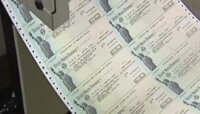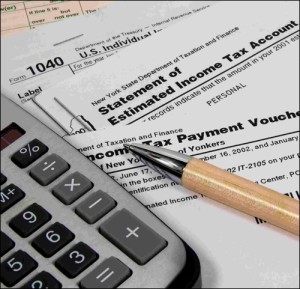Dear Bonnie, I have my own business and a lot of marketing and promotion revolves around entertaining clients. I write it all off. Well, a friend of mine, also a business owner, was just audited and told me that the IRS didn’t let him take all of his entertainment deductions. What’s the deal on this? If it’s all about business, then can’t you write it off? I even heard that you don’t need receipts. Ken, Sonoma
Hi Ken, So many business owners believe that just because there is a line item on the tax return for meals and entertainment deductions that just about any dinner or theatre ticket or sporting event involving a client or potential client qualifies as a valid deduction. I’ve gone to lunch with clients who discuss their child’s soccer career, movies they’ve seen, and other non-business related matters. When the check arrives, they snatch it up, saying, “You’re my accountant so I can write this off, right?” Wrong! Sorry.
It’s not that straightforward or easy. Smug IRS agents love nothing better than quizzing you about the conversational content of your meals and entertainment, then joyfully proclaiming, “Disallowed!”
There are rules. And essentially, the rules say, “If you’re having way too much fun, it’s not a deductible expense.”
First of all, any entertaining you provide must be directly related to the active conduct of your business or associated with a directly related discussion that preceded or followed the meal or entertainment. So if you take me to lunch and we do not discuss tax planning strategies or sales projections or problems with your general ledger, and instead discuss only personal matters, then you will not be able to write off the lunch.
This also means that giving a party for the sake of establishing goodwill is not enough to make the party deductible. In order to deduct the cost of the party, you must conduct business before, during, or after the party. This rule applies to any form of entertainment and meals. That means you need to include a product demonstration, a reveal of a new product or service, a sales pitch or an educational talk related to your product or service. And the environment must be conducive to conducting business. So a rip roaring drunken brawl of a party would not qualify.
Atmosphere is everything. The IRS once disallowed a deduction of tickets to a baseball game because the volume levels at a ball part do not allow for a comprehensive business discussion. But if the business discussion had taken place prior to the ball game or shortly afterward, it would have been allowed.
Of course, giving a sales pitch at the end of a party where liquor has been served is much like talking politics with sugar infused five-year-olds. As a write-off, it’s not going to fly.
When it comes to parties, the guest list also determines the extent to which you can write off the party. You may deduct 100% of your cost if: 1) The party is open to the general public, or 2) The party is for employees and their spouses
If the party is for clients, potential clients, and independent contractors associated with your firm then you may deduct only 50 percent of the cost. If there is a mix of employees and spouses along with clients and potential clients, you may allocate part of the cost as a 100 percent write-off and the remainder as a 50 percent write-off based on the number of guests in each category.
Another rule invoked by the IRS is that the entertainment may not be “lavish or extravagant.” That’s another one of those subjective, gray areas that can be argued to death with an auditor, his manager, all the way up to tax court. But why go there? Keep it simple. Make sure the entertainment or meal is aligned to your company’s budget. If your bottom line is zero, you will likely not be allowed a write-off for flying in potential clients in first class accommodations to attend a soiree at the fanciest country club in town. Be prepared to defend the deductions you take.
Meals provided to employees during business hours for your convenience (usually to keep them there working during a crisis or busy time) are 100 percent deductible. Track these costs separately, under a category called “crew meals” on your books so that at tax time your tax pro doesn’t inadvertently apply the 50 percent rule.
You cannot deduct repeated lunches with business associates where one time it’s your turn to pay and the next time it’s his or her turn to pay.
You cannot write off the cost of entertainment facilities including mortgage interest, property taxes, depreciation, and rent for swimming pools, bowling alleys, tennis courts, cars, homes in a vacation resort, boats, etc. You can write off the cost of a hotel hospitality suite during a trade show, but you cannot write off the cost of a yearlong contract for a hotel suite that you use for entertainment purposes. See the difference?
You cannot deduct dues paid to golf and athletic clubs, country clubs, hotel clubs and clubs that provide meals even while participating in business discussions.
Always keep documentation to prove your case in the event of audit. Here are some tips:
1. If you are having a party, make sure the invitation announces a business purpose.
2. Keep a guest list. Have attendees sign a guest book or track RSVPs so you can prove an accurate allocation of the expense between employees (100 percent deductible), independent contractors, clients, and potential clients (50 pecent deductible) and family members and friends (not at all deductible).
3. Take pictures of guests looking at your new products or a video clip of your product demonstration; anything that proves the business purpose.
4. Keep all receipts for all expenses incurred. You asked about receipts, Ken, Well, you needn’t keep receipts if the meal or entertainment cost less than $75. A journal entry in your appointment book with the amount, location, and names of those you entertained is sufficient and necessary to pass the scrutiny of an auditor.
5. Maintain all of the above documentation in your tax file.
So go ahead and take your accountant to lunch – just make sure to go over the books before, during or after the meal.
Bonnie Lee is an Enrolled Agent admitted to practice and representing taxpayers in all 50 states at all levels within the IRS. She is the owner of Taxpertise in Sonoma, and the author of Entrepreneur Press book, “Taxpertise, The Complete Book of Dirty Little Secrets and Hidden Deductions for Small Business that the IRS Doesn’t Want You to Know.” Follow Bonnie Lee on Twitter at BLTaxpertise and at Facebook.



